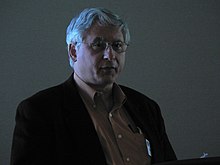Paul J. DiMaggio
Paul Joseph DiMaggio (born January 10, 1951 in Philadelphia , Pennsylvania ) is an American sociologist and has been a professor at New York University since 2015 .
Life
Di Maggio graduated from Swarthmore College and received MA and Ph.D. in Sociology from Harvard University . In 1979 he went to Yale University as a Postdoctoral Fellow , where he later became an Assistant Professor and then Professor at the Sociology Department and the School of Management. From 1992 to January he taught at Princeton University . He has been an elected member of the American Philosophical Society since 2016 .
research
His research is particularly concerned with organizations and institutions. One of his most influential works is the concept of isomorphism , which he developed together with Walter W. Powell . This implies that organizations emulate their behavior and processes from other organizations - not to increase efficiency, but to gain legitimacy.
Publications
- Nonprofit enterprise in the arts: studies in mission and constraint , New York: Oxford University Press, 1987, ISBN 0-195-04063-5
- With Sharon Zukin: Structures of capital: the social organization of the economy , Cambridge: Cambridge university press, 1990, ISBN 0-521-37678-5
- The relevance of organization theory to the study of religion , New Haven: Institution for Social and Policy Studies, Yale University, 1992
- The twenty-first century firm: changing economic organization in international perspective , Princeton; Woodstock: Princeton University Press, 2003
- Gender, networks, and cultural capital , Amsterdam: North-Holland, 2004
- With Walter W Powell: The new institutionalism in organizational analysis , Chicago: University of Chicago Press, 2008, ISBN 0-226-67709-5
Web links
- New York University: Paul J. DiMaggio
Individual evidence
- ^ Member History: Paul DiMaggio. American Philosophical Society, accessed July 17, 2018 (English, with a short biography).
- ^ PJ DiMaggio, WW Powell: The Iron Cage Revisited: Institutional Isomorphism and Collective Rationality in Organizational Fields. American Sociological Review , 48 (2), 1983, pp. 147-160
| personal data | |
|---|---|
| SURNAME | DiMaggio, Paul J. |
| ALTERNATIVE NAMES | DiMaggio, Paul Joseph (full name) |
| BRIEF DESCRIPTION | American sociologist |
| DATE OF BIRTH | January 10, 1951 |
| PLACE OF BIRTH | Philadelphia , Pennsylvania |
